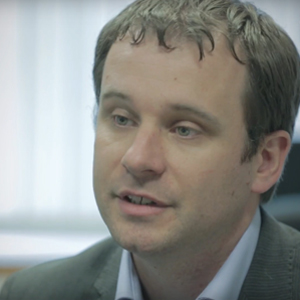Targeting treatment resistance through RNA methylation
Fast facts
- Official title: Targeting Glioblastoma drug resistance through RNA methylation
- Lead researcher: Dr Stuart Smith
- Where: University of Nottingham
- When: February 2020 – August 2022
- Cost: £119,000
- Research type: Adult, Glioblastoma (High Grade), Low Grade, Academic, Treatment resistance
- Grant round: Expanding theories
What is it?
This grant explores the idea that a fast-acting process, called RNA methylation, may be responsible for treatment resistance in glioblastoma (GBM) tumours.
Like DNA, RNA is a code that tells cells what to do. In fact, DNA is the code to make RNA, which in turn provides information to make proteins. And it’s the proteins in the cell which do all the ‘work’.
Methylation adds a methyl group to the RNA code, meaning it acts like a switch that turns the protein manufacture off. To date RNA methylation has been studied mostly in plants, but it has also been linked to fast-acting human processes, like the way that our metabolism changes throughout the day.
Researchers, led by Dr Stuart Smith in Nottingham, will investigate the levels of RNA methylation in GMB cells and compare them to levels in low grade tumours. They will then test the theory that RNA methylation is responsible for some GBM tumours becoming resistant to current treatments.
This work has five aims:
- Measure the different methylated RNAs from the centre, rim and edge of frozen samples of low grade (grade II) gliomas and GBMs
- Grow low grade tumour cells and GBM cells in three-dimensional (3D) cultures in the lab, in very low levels of oxygen to simulate the environment of some brain tumours. Then analyse changes in the methylated RNAs of these cells to assess how well they mimic the samples used in the aim above
- Expose the 3D cell cultures to chemotherapy drugs, and analyse the ones that survive (and have become resistant to treatments) for any changes in RNA methylation
- Use different drugs, that alter RNA methylation levels, to try and reverse chemotherapy resistance
- Adapt a new technology, called liquid chromatography mass spectrometry (LC-MS), to allow quick measurement of all methylated RNAs in a sample
By gaining understanding of RNA methylation in the brain tumour field we will be ready to rapidly translate and re-purpose useful agents [drugs].
Dr Stuart Smith
Why is it important?
Glioblastoma is the most common malignant primary tumour occurring in adults and affects 2,200 individuals in England, annually. Glioblastomas have extremely poor survival rates, with only 5% of patients surviving 5 years beyond diagnosis. The dismal prognosis is because of the tumour’s resistance to treatments.
This work is taking a new approach to the problem of drug resistance in GBM and low grade tumours.
Many tumour behaviours e.g. drug resistance, happen quickly and the speed of RNA methylation provides a new avenue of investigation into why this happens.
Learning how drug resistance comes about is only the first step. This research team are also looking into how they can stop, or even prevent, resistance in this aggressive tumour type.
Exploring ideas for enhancing existing treatments, or even discovering new treatments, will help to drive us forward to a world where brain tumours are defeated.
Who will it help?
This study will help people who are diagnosed with a grade II or grade IV (GBM) brain tumour in the future.
It has the potential to provide greater understanding of the ways tumours can resist the tumour-killing effects of chemotherapy, and the ways we can combat this.
Milestones
This grant has yet to start, but we look forward to sharing progress in the future.
If you have any questions about this, or any of our other research projects, please contact us on research@thebraintumourcharity.org
Research is just one other way your regular gift can make a difference
Research is the only way we will discover kinder, more effective treatments and, ultimately, stamp out brain tumours – for good! However, brain tumours are complex and research in to them takes a great deal of time and money.
Across the UK, over 100,000 families are facing the overwhelming diagnosis of a brain tumour and it is only through the generosity of people like you can we continue to help them.
But, by setting up a regular gift – as little as £2 per month – you can ensure that families no longer face this destructive disease.
In this section

Dr Stuart Smith is a neurosurgeon at Nottingham University Hospitals NHS Trust as well as holding a research post with the University of Nottingham.